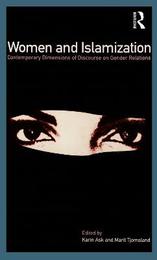
|
Women and Islamization: Contemporary Dimensions of Discourse on Gender Relations
Paperback / softback
Main Details
| Title |
Women and Islamization: Contemporary Dimensions of Discourse on Gender Relations
|
| Authors and Contributors |
Edited by Karin Ask
|
|
Edited by Marit Tjomsland
|
| Physical Properties |
| Format:Paperback / softback | | Pages:211 | | Dimensions(mm): Height 234,Width 156 |
|
| Category/Genre | Islam |
|---|
| ISBN/Barcode |
9781859732557
|
| Classifications | Dewey:305.486971 |
|---|
| Audience | | General | | Professional & Vocational | |
|---|
|
Publishing Details |
| Publisher |
Bloomsbury Publishing PLC
|
| Imprint |
Berg Publishers
|
| Publication Date |
9 January 1998 |
| Publication Country |
United Kingdom
|
Description
The current Islamic revival is frequently associated with fundamentalism and radical politics. This reinforces Western perceptions of Islamic women as victims of a sexist and reactionary rule. What many outsiders fail to realize is that quite a number of Muslim women are ardently embracing their religion as a means through which they can express gender identity, power and creativity. In overturning ingrained notions of Muslim women's subjugation, this timely book situates Islam as a religion undergoing reinterpretation and change -- especially in relation to gender identities -- rather than as a monolithic movement reacting against westernization and modernization. Through their political, educational, and recreational activities, more and more Muslim women are setting agendas of their own and are actively redefining the role of women in Muslim society.
Author Biography
Karin Ask Chr. Michelsen Institute Marit Tjomsland Chr. Michelsen Institute
Reviews'This book is an important contribution to cross-cultural understanding of Muslim women.' Journal of Islamic Studies ' "Women and Islamization" makes a good job of contesting descriptions of women's relations to Islam as being universally its victims' Journal of the Royal Anthropological Institute 'Islamic feminism...leaves open the question, how does such an apparent oxymoron work? How can activism on behalf of women square with the imposition of religious norms that favour men? In other words how can one be a feminist and an observant muslim? This volume of essays about the impact of islamization on the social roles of women and their spiritual pratices starts to answer this vexed question by bringing a much needed, new perspective to a topic hemmed in by prejudice.' Association for Middle East Women's Studies
|